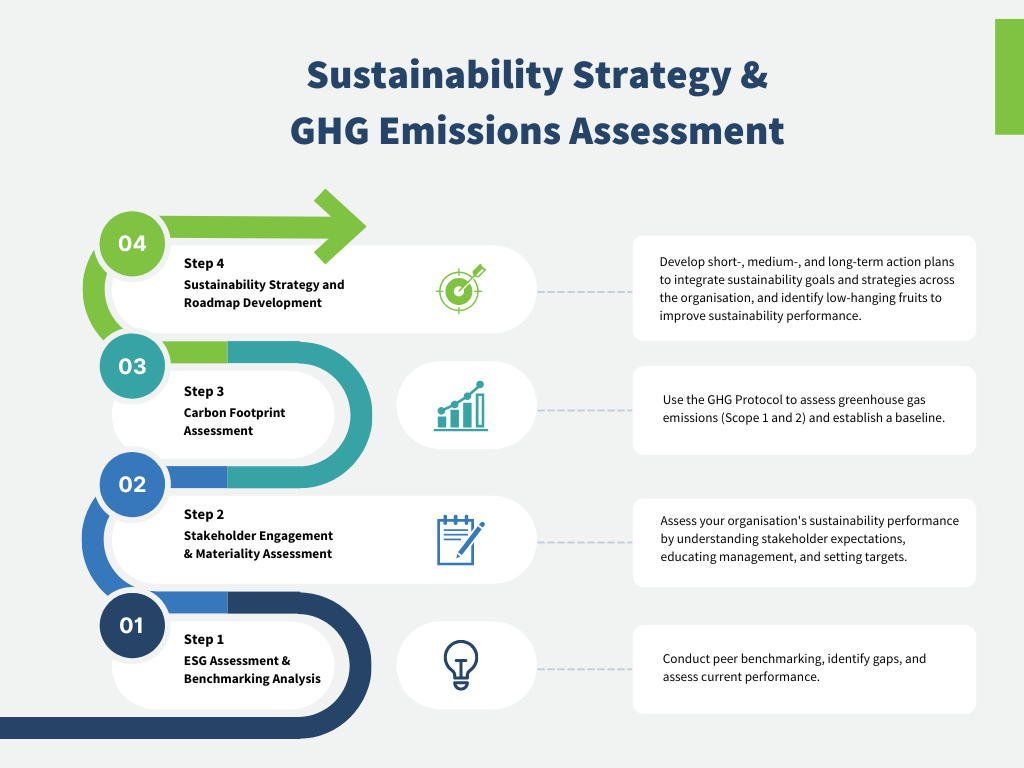Today, it is imperative for organisations to focus on their environmental and social impact as much as their bottom lines. Sustainability is the cornerstone to success, and it paves the way for profitability in the future. When an organisation can address present needs without damaging the ability of future generations to fulfil theirs, they have a sustainable business model. A well-designed Business Strategy that is integrated with a sustainability roadmap hedges business risks, encourages innovation, and also lays the foundation for a more resilient stakeholder relationship.
Sustainability is no longer an option for organisations that seek success but an imperative. This is why businesses, governments and multilateral organisations seek out ESC, leading environmental, safety, and sustainability consultant, to access customised, innovative, and best fit solutions.
Defining Purpose, Priorities, and Goals for Sustainability Roadmap
A sustainability roadmap is a document that defines the organisation’s purpose, priorities and goals for sustainability.
Defining Your Purpose
The first step in creating a sustainability roadmap is to define your purpose. What do you hope to achieve with your sustainability efforts? Do you want to reduce your environmental impact? Improve your social responsibility and your corporate governance?
Once you know your purpose, you can start to identify your priorities.
Identifying Your Priorities
What are the most important areas where you can make a difference? Some common priorities include:
- Reduce carbon emissions: Using renewable energy sources, improving energy efficiency, and reducing deforestation.
- Water conservation: Managing water resources to ensure sustainable use.
- Waste reduction: Keep resources in use for as long as possible, by repairing, reusing, and recycling materials.
- Sustainable procurement: By purchasing sustainable products and services.
- Improve Diversity, Equity, & Inclusion (DEI): Promoting diversity, equal opportunities, and a culture of belonging.
- Improve Corporate Governance: Enhancing operational systems, transparency, accountability, and ethical decision-making.
Setting Specific Goals
When setting your goals, it is important to consider the organisation’s specific sustainability objectives, as well as the organisation’s current capacity. Once specific goals have been set, it is important to develop a plan to achieve them. This plan should include specific actions that will be taken, as well as a timeline for implementation. It is also important to track progress and adjust the plan as needed.
Here are some additional tips for setting specific goals for sustainability roadmap:
- Involve all stakeholders in the goal-setting process.
- Make sure the goals are aligned with the company’s overall strategy.
- Set realistic and achievable goals.
- Break down large goals into smaller, more manageable steps.
- Communicate the goals to all employees and stakeholders.
- Track progress, review and update the roadmap regularly.
Formulating a Sustainability Roadmap
A sustainability roadmap is effectively implemented when key aspects are considered, including meeting international standards to meet client’s needs. ESC takes a comprehensive and integrated approach to formulate a sustainability roadmap, aligning it with the company’s overall business goals, strategies, and environmental, social, and governance (ESG) commitments. It is benchmarked against international standards and follows industry best practices with all its sustainability solutions.
With diverse teams possessing multidisciplinary skill sets and industry expertise, ESC delivers optimal results from stage 1. Recognising the importance of regional differences, our hand-picked professionals ensure that the roadmap addresses local nuances while adhering to international standards. Here are the steps we follow to create a sustainability roadmap for our clients:

Results in the real world
ESC has a proven record of effectively implementing a sustainability roadmap that yields concrete benefits including:
- Growing business resilience
- Improved brand value/ goodwill
- Optimization of capital
- Enhanced appeal to conscious customers
For example, our decarbonisation and sustainability roadmap for a hyperscale data centre chain has even turned the traditionally carbon-intensive business well on track to be 100% renewable in the future. A climate change risk assessment for an aromatics complex operator helped the business put robust and efficient mitigation and adaptation solutions to avert future climate risks. In short, any business can benefit itself as well as the environment by hiring a trustworthy sustainability consultant to create an earth-friendly roadmap.
One key factor is that sustainability initiatives must be cohesive across the organisation, meaning that they must have buy-in from the top management levels. Of course, to measure the efficacy of the roadmap and match it to the predefined goals, we also lay in place tools to report results and measure progress. These tools also aid in conveying the success of the strategy to stakeholders.
A multipronged ongoing process
ESC’s multipronged ongoing process drives long-term strategies to consistently achieve sustainability goals for organisations in the ASEAN and APAC regions. As a leading sustainability consultant, we go beyond assessments and roadmap creation, ensuring compliance with high standards and addressing crucial parameters year after year. With dedicated teams and exceptional local knowledge across Asia, ESC delivers world-class, custom-honed sustainability solutions for ASEAN and APAC clients. Talk to us right away to take the first step towards a practical, implementable sustainability roadmap that will outperform your expectations.

